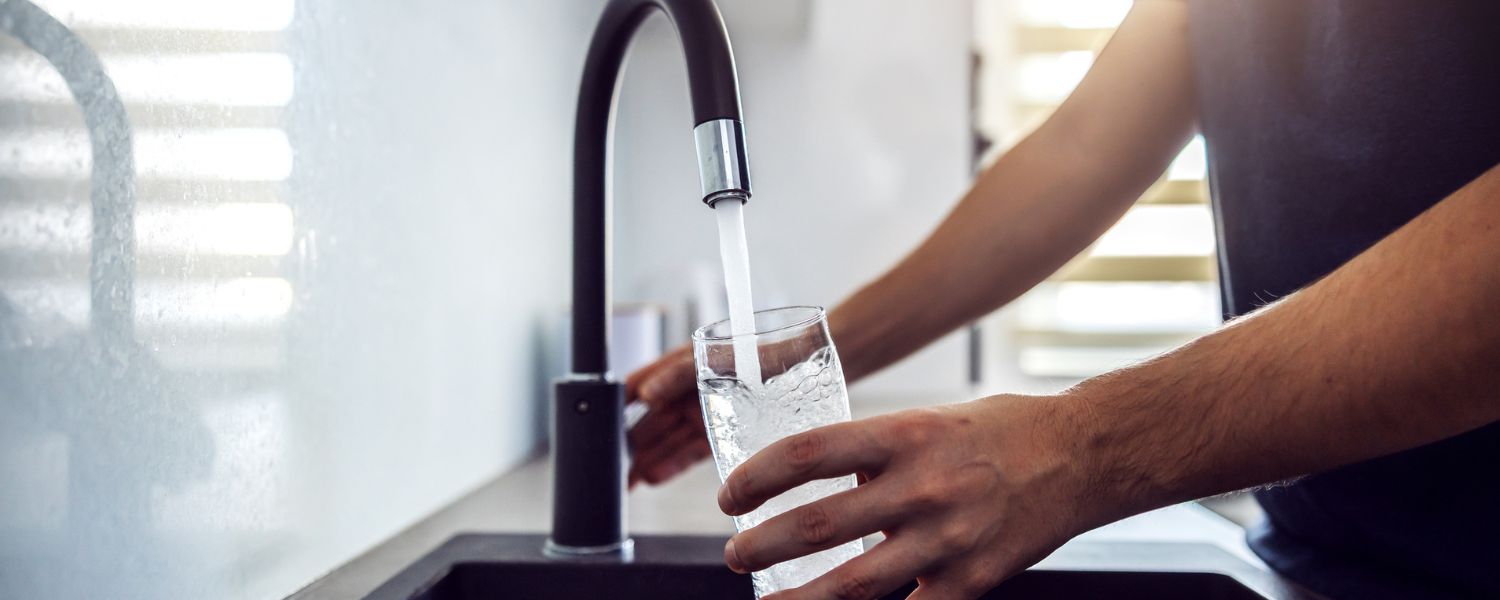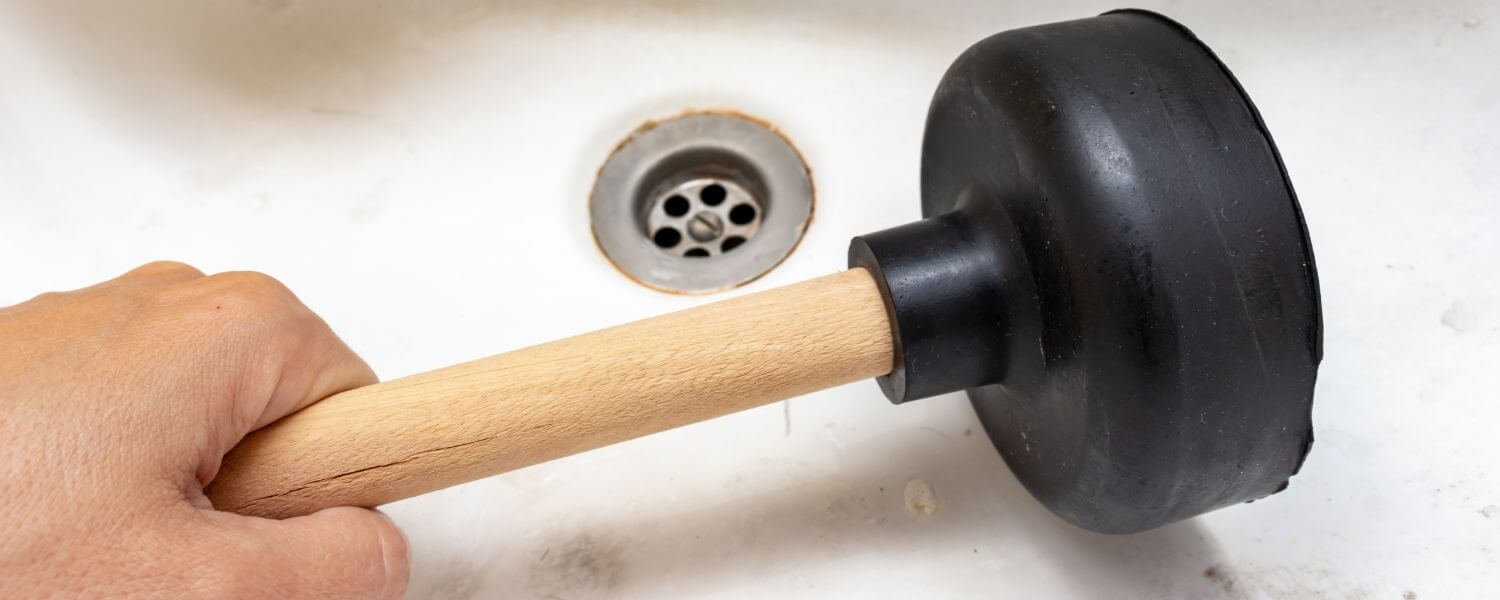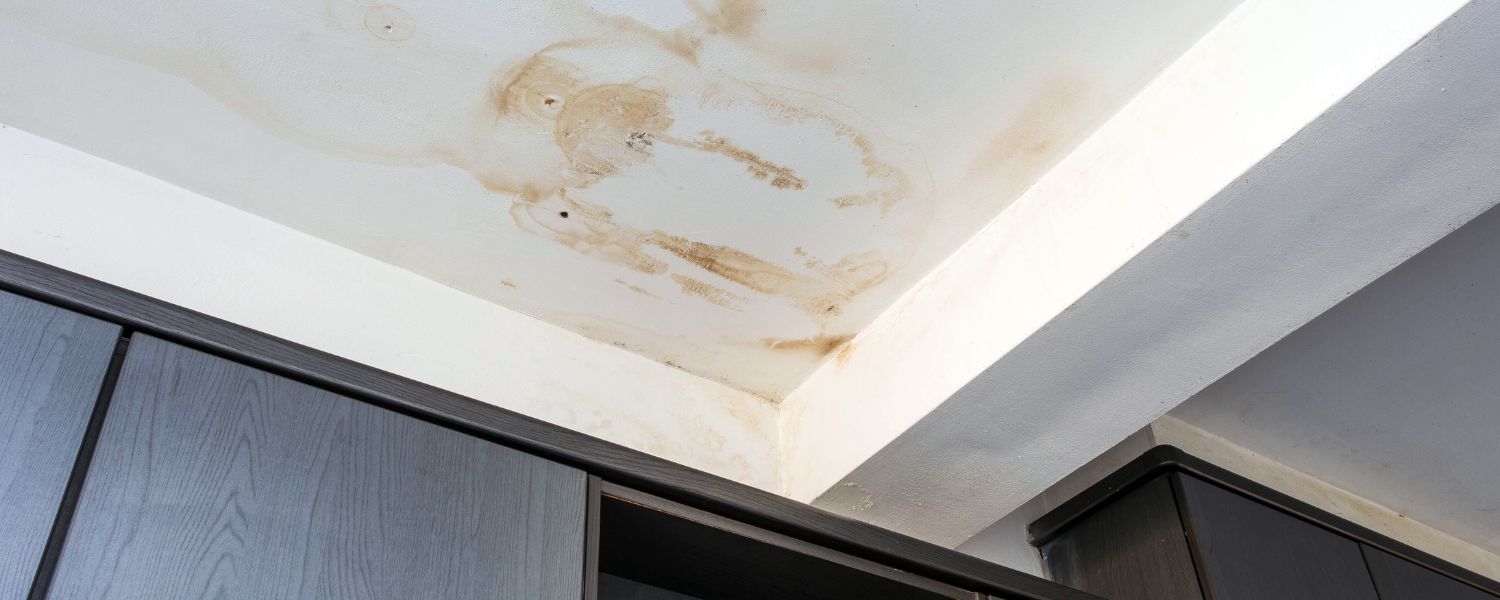Slab leaks left undetected can cause major damage to your home. When left for long periods, moisture can lead to mold growth and mildew in flooring and walls, increasing the cost of repairs and remediation.
Wet spots and moisture are some of the most common signs homeowners discover that lead them to suspect a slab leak, but these slab leak signs can also indicate that the leak has been happening for some time.
What is a Slab Leak?
Slab leaks occur in either the hot or cold copper water pipes under the slab, not in the slab foundation itself. The copper lines develop small holes over time for a number of reasons, and once the copper pipes are compromised, water will begin to seep out.
Typically, leaks begin slowly, and water will work its way up through the foundation. Water can seep for days or even weeks without anyone noticing that it’s going on. And, before you know it, it can erupt and flood your home without warning—which is why it’s essential to learn about slab leak signs.
Once homeowners notice signs of slab leaks, slab leak detection should be performed immediately to prevent further damage.
What are Signs Homeowners have a Slab Leak?
Some early warning signs include:

High Water Bills
Homeowners can detect early leaks by monitoring their water usage and water bills. Even the smallest leak can affect how much water homeowners use. When comparing normal use against previous months, homeowners can determine if there is a discrepancy. When there is a fluctuation that does not seem comparable to water actually used, a leak is the most likely cause.
If homeowners notice a huge spike from one month to the next, it is good practice to look for other signs throughout the home, such as warm spots on tile or hardwood, damp spots on carpeting, fluctuations in hot water pressure, and water running sounds when the water is off at every tap.
Hearing Running Water When Pipes Aren’t in Use
The sound of a leak coming from the toilet is easily noticed as it is something homeowners use every day. However, if homeowners listen closely, slab leaks can also emit the sound of running water when the pipes aren’t in use.
If homeowners suspect any kind of leaks, or notice a change in their water bill, they can turn all taps off within the home and go through the house listening for the sounds of water running. Because slab leaks are caused by pressurized water lines under the foundation, it might be hard to detect without knowing what you are listening for.
The sound can also be deceiving, as it may sound like the water is running inside of the walls instead of under the foundation.
At the first sound of water running when the pipes aren’t in use, homeowners should contact a professional plumber to perform leak detection in case it is a leak in the copper water lines under the slab foundation.
Decreases in Water Pressure and Fluctuations in Hot Water
Have you ever been in the shower when all of the sudden the water pressure drops or turns cold for an instant?
This can happen for many reasons, but one of them may indicate an early sign of a hot water slab leak.
When the pipes develop a leak under the slab, the water flow is disrupted and creates pressure fluctuations as it is being sent to fixtures such as showers and faucets. Water pressure drops and hot water fluctuations can vary for a few seconds or be ongoing.
There are more signs of a slab leak that indicate the leak may have been happening for some time. If homeowners notice any of these signs, they should contact a professional plumber as soon as possible.
Warm or Hot Spots on Your Floor
Pets are surprisingly helpful at detecting slab leaks. House cats and dogs are habitual animals and tend to have favorite napping spots throughout their home.
Paying attention to your pet’s favorite spots can be telling if all of a sudden, they are choosing new places to settle in and are spending a lot more time there.
When a hot water pipe is leaking under the slab, it will essentially warm the concrete foundation and the heat rises to the surface creating the perfect spot for cats and dogs to curl up and get cozy.
Mold Problems or Smell of Mildew
Mildew smells and mold growth typically indicates a leak has been ongoing for some time. Likely, it began as a slow leak and the moisture went unnoticed, allowing for the growth of mold.
Often, homeowners miss early signs of a slab leak, and the appearance of mold along the baseboards and walls is a sign to call a professional slab leak specialist.
Homeowners can be proactive in leak detection by periodically checking along the baseboards throughout their home and in closets for any signs of growth.

Damp Carpet
Like warm spots on hardwood and tile, damp carpeting is a clear indication of a slab leak. Because there is no substrate blocking the water like tile or hardwood, the water leaks under the slab can eventually saturate carpets above the general spot of the pipe leak.
Cracks in Baseboard, Walls, or Flooring
Cracks in baseboards, walls, or flooring can be warning signs of a slab leak in your home. When there’s a slab leak, moisture can damage your flooring. This moisture can also cause cracks in the lower sections of the walls or on baseboards. These cracks can start out small, but they can go from what looks like a small hairline fracture to something much wider over time. Keep an eye out, monitoring any cracks in your walls, floors, or baseboards.
Water Pooling Inside or Outside Your House
If there’s noticeable water pooling inside your home, you may have a slab leak, especially if the pool of water is located around plumbing appliances, such as washing machines. Have you noticed a pool of water outside the perimeter of your house even though it hasn’t rained, or you haven’t watered the area in a while? If these warning signs of a slab leak sound familiar, you should have it investigated by a slab leak specialist as soon as possible.
What Causes a Slab Leak?
Slab leaks are more likely to happen in older homes, but any home with copper water lines under the slab is susceptible to a slab leak.
High water pressure is one of the most probable causes of a slab leak. When the water pressure coming into the home is too high, it creates expansion and contraction of the water lines and the pressure has to escape somewhere. As the pipes under the foundation expand, they rub against the concrete and the friction can cause the pipe to wear down over time.
In San Diego, corrosive soil can add to friction slab leak causes as it is more abrasive and acts to quicken the deterioration of the copper water lines under the slab foundation. Foundation shifting from natural settling and earthquakes will also contribute to this as a factor of slab leak causes.
All causes of a slab leak generally take years to do any real damage, so older homes are typically at a higher risk.
Potential Consequences of Ignoring a Slab Leak
Don’t ignore the signs of a slab leak. Slab leaks are serious, and if you aren’t proactive about getting it fixed quickly, it can destroy your home. Here are some of the potential consequences of ignoring a leak under the slab.
Foundation Damage
The foundation of your home supports its structure and helps prevent uneven settling. Without a solid foundation, your home isn’t secure. You can think of your home’s foundation as the backbone that keeps it all together. So, when there is a leak under the slab, the ground beneath the foundation is saturated and will eventually cause the soil to shift and erode. Over time, the stability of your home is compromised, and you’ll start to notice foundation cracks and uneven floors, and your home’s structure may even collapse.
Damage to Yard and Landscaping
You work hard to keep your yard looking like an oasis. However, a slab leak can ruin all your hard work and make your landscape a soggy mess. When there’s a slab leak, a continual water flow will saturate the soil, possibly killing plants. Too much water in your landscape can erode the soil, cause sinkholes, and destroy driveways and pathways.
Foul Odors
One of the slab leak symptoms is mold growth. That’s because a leak under the slab is a breeding ground for mildew and mold. Mold and mildew release foul odors that make their way into your home. Ignoring a slab leak allows mold and mildew to thrive and fill your home with an unpleasant smell.
Flooring Damage
Nice flooring is an investment that a slab leak can quickly ruin. A leak under the slab can warp and discolor hardwood floors. Tile and vinyl flooring aren’t exempt from the damage caused by prolonged exposure to moisture either.
Health Hazard
The last thing you want to deal with is uncontrolled mold growth. Mold spores can cause several health issues, such as respiratory problems and trigger allergies. When you ignore a slab leak, mold can keep growing, eventually spreading onto walls, ceilings, and furniture. It can cause serious illnesses, especially in those with a weakened immune system or lung diseases.
How to Detect a Slab Leak
The best method to catch a slab leak early on is vigilance. Homeowners can remain vigilant by checking all fixtures, monitoring water bills and usage, and looking for signs of moisture throughout their home on a monthly basis.
Homeowners should also note any signs of previous leaks, such as corrosion around water fixtures and water lines at the water heater. This is a good indication of high water pressure spikes that can eventually lead to a slab leak.
Once a homeowner suspects a leak, a professional plumber can pinpoint the exact location and provide the best option for repair and water damage remediation.
Slab leak detection does require specialized equipment and knowledge to ensure the exact location is correct; being off by even a small amount can change the repair options and end up costing homeowners more money and time. Call experienced, certified plumbers who have the specialized tools and knowledge to detect slab leaks, like the experts from Bill Howe Plumbing.
Proactive Measures to Prevent Slab Leaks
Slab leaks are not completely preventable unless homeowners decide to eliminate all water lines under the foundation and have their home repiped. This is a costly option and is typically not covered by homeowner’s insurance.
However, there are some ways to lessen the likelihood of a slab leak. Homeowners should regularly monitor their water bills against normal usage and note any variations.
Homeowners should ensure they have a pressure regulating device installed and set at a safe pressure between 50 and 75 PSI. Fluctuations in pressure can cause small leaks such as fixture drips and toilet’s running, so any small issues can indicate high water pressure that should be taken care of immediately.
To help monitor your water pressure,Bill Howe can install Moen’s Flo Smart Water Monitor and Shutoff. This device can tell you if your water pressure suddenly changes, whether up or down. It’s an excellent preventative measure to protect against leaks and monitor your overall water usage. It also allows homeowners to shut the water off to the house remotely!
Any fluctuations in water usage and pressure can indicate something is happening. If caught early, it could mean the difference between a small repairable leak and a slab leak that has the potential to cause major damage and costly repairs.
We recommend doing the following:
- Regular Inspections: Scheduling regular plumbing inspections may help catch potential issues early.
- Pipe Maintenance: Using water softeners can prevent pipe corrosion, which leads to leaks.
- Foundation Care: Maintain proper drainage and moisture levels around the home’s foundation to prevent soil shifts.
Effective Slab Leak Repair Solutions
There are several options for repairing a slab leak. The most common and quickest repair will be a direct slab leak repair through the foundation. Direct slab repairs take less time and are covered in part by homeowners insurance; typically, they will cover a portion of the damage and reconstruction repairs.
However, direct slab leak repairs only fix the current leak. If a section of pipe has developed a leak or has been compromised, the likeliness of another part of the pipe in a different location leaking becomes higher.
Slab repiping is when the plumber eliminates the leaking line in the slab foundation and repipes up through the walls, garage, or exterior of the home. This eliminates all future leaks on the rerouted line only. Insurance sometimes will cover the location service, but rarely covers the actual reroute.
Whole house repiping is the most involved solution for eliminating a slab leak, but it is the only option to prevent all future slab leaks. Repiping eliminates all water lines in the slab and re-pipes the lines throughout the home. Plumbers can provide free estimates for whole home repiping, but homeowner’s insurance does not cover slab repiping. Nevertheless, homeowners can qualify for financing and Bill Howe plumbers are experts in repiping.
Homeowners can also choose partial home repipes or rerouting of the copper water lines under the slab to prevent leaking from certain lines. This is less than a whole home repipe, and depending on where the leak is under the foundation, some homeowner insurance policies will cover a partial reroute or repipe.
Trenchless pipe repair can be a cost-effective way to fix slab leaks, too. Homeowners looking for a less invasive method may want to consider this.
Take Action Now: Protect Your Home from Slab Leaks
To avoid costly damage and headaches, it is best to address slab leaks the moment a homeowner notices the first sign. Being aware of how slab leaks work and what causes them provides the best tools to detect leaks early.
At Bill Howe, we understand that a leak under a slab can quickly turn into a stressful situation. To help ease the strain, we offer flexible financing options and a friendly team of highly skilled slab repair specialists who get the job done right the first time. We also offer an exclusive Family Plan, which includes a whole house plumbing inspection and other must-have services that can help prevent significant repairs.
If you notice any of these signs of a water leak under the slab, contact us online or call 1-800 Bill Howe (245-5469) today. The professional slab leak repair specialists at Bill Howe will offer a one-stop solution for detection, repair, and remediation. When it comes to slab leak detection and repair, we know Howe!
Book Now!
FAQs
How long can a slab leak go undetected?
Some slab leaks signs are hard to spot, so they may often go undetected for quite some time. Unfortunately, ignoring slab leak symptoms may lead to significant problems, including mold damage and an overwhelming presence of termites, which can cause major damage to wooden structures. Keep an eye out for more subtle slab leak signs, like rising water bills and the sounds of running water.
How common are leaks under slabs?
Slab leaks tend to materialize in homes where earthquakes are common, like in Southern California. Slab leaks are also widespread in older homes constructed on concrete foundation slabs. If you live in an older home in Southern California, it pays to be mindful of the warning signs of a slab leak.
How hard is it to fix a slab leak?
Fixing a slab leak is not a DIY project—it’s a job for professionals. The range of difficulty depends a lot on how the water lines are run and the framing of your house. It can be a difficult and time-consuming fix that can take several days to complete.
How to respond if you suspect a slab leak
When you recognize the signs of a slab leak, call an experienced, licensed plumber immediately. A slab leak repair specialist has the proper tools and know-how to quickly diagnose and pinpoint the leak’s location.
Is a slab leak an emergency?
A slab leak can cause costly damage to your home, including severe foundation problems if not addressed quickly. A leak under a slab can also lead to hazardous mold growth. So, yes, a slab leak is an emergency.




